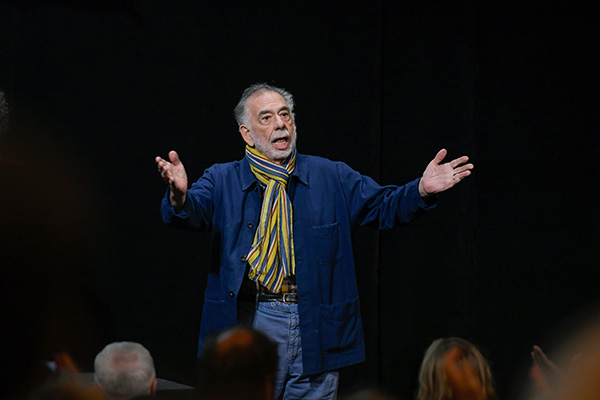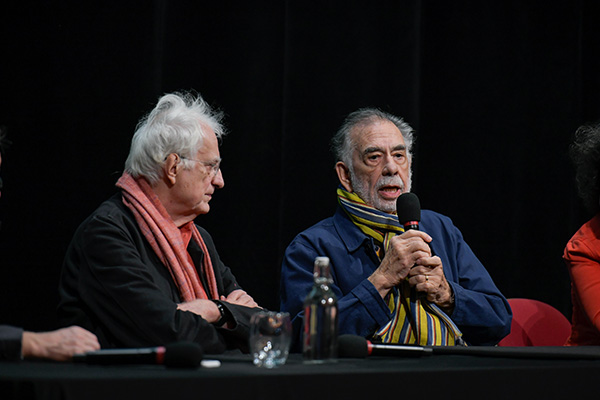The Conversation
with Coppola
PostED ON OCTOBER 19 AT 11AM
Incessantly learning, improving without ever feeling like a master; Francis Ford Coppola won over the audience with his humility and astuteness of the cinema.
By nine o'clock in the morning, a long line of moviegoers was already waiting for the doors of the Théâtre des Célestins to open. But it was not until a little after 3pm that Francis Ford Coppola, in casual Friday attire, was called to the stage by Thierry Frémaux and Bertrand Tavernier for an hour and a half of conversation, which the filmmaker wanted to make interactive so that the many students in attendance could have a chance. "I was the one who chose the word Conversation," said Coppola. “The term master class was used once, for a play on Maria Callas, and since then, it has been applied to everything. There is no master here, except for Martin Scorsese, who has studied and teaches cinema. In any case, I’m not one.” The filmmaker then added, “However, I hope you’ll leave here having found this exchange useful. Be convinced that I have more to learn from you than you from me.”
THE OPENING SCENE OF A MOVIE
It can come from a dream, but when it’s not the case, I try to quickly find the word or words that will convey the theme I want to illustrate. It may be” intimacy” for The Conversation, “succession” for The Godfather, “morality “for Apocalypse Now. Then a hundred questions will arise, for which I’d intuitively have as many answers. And when I’m out of ideas, I come back to the main theme.

Copyright Institut Lumière / Jean-Luc Mège
PATTON
I had written Patton's opening scene after a doing a great deal of documentary research on the character. Writings had described him as a colorful man, who believed in reincarnation, who proudly wore his stripes. So, I imagined a first scene where the audience would see him in all his glory, and believe themselves under his orders, invigorated. But Burt Lancaster did not like starting the film with the end to describe the character, and I was fired. Then George C. Scott took over his role and someone from the studio remembered that a young man had written something. I was called back. The moral of the story for you students: be convinced that the things for which you can be fired are things you will be given awards for as your career advances!
EINSENSTEIN AND GIRLS
Growing up, I changed schools every year until I found a middle school that had a great movie theater. And for the first time, I stayed there for four years, because that's where the girls were! One afternoon, I discovered the screening of “October” by S. M. Eisenstein. I couldn’t believe my eyes, because, although the film was silent, through the art of editing, I could have believed it had sound. So, I turned my back on the theater and I told myself that I would go learn to make films.
ROGER CORMAN
With this B-series producer, I started at the bottom of the totem pole, doing just about everything needed on the set. It was very instructive. And as he was conscious of every cent, I realized that one needed money to make movies. Corman is 92 years old now and remains very active. I don’t know what he must have thought when he discovered Apocalypse Now (which was much more costly than movies produced by Corman), except that I had to be crazy - and he wouldn’t have been wrong, because it's a movie whose scope overwhelmed me. But know that everything you see in the movie really happened. Nothing was digital!

Copyright Institut Lumière / Jean-Luc Mège
THE IMPORTANCE OF SOUND
At the time, the work of sound could be an afterthought on a lot of films. In our San Francisco gang, there was George Lucas, and we had a very strong awareness that the emotion of a film has its origin in sound. Dolby was created in San Francisco. Then there was the transition to the digital. The question arose on Star Wars. George Lucas said to himself, since there will be a lot of special effects, why not directly shoot a digital movie?
THE PRODUCER
As bad as a relationship can get with a producer, it can also be fruitful. Yes, the conflict, the stress can be fertile and sometimes the best idea is often the cheapest. Bob Evans, in entrusting me to direct The Godfather, launched my career, it’s obvious. But know that when I was asked to make The Godfather: Part II, it was on the condition that he not produce it! As soon as we get gain standing, we all want to get rid of the producer. However, a producer can also have a pivotal role. I know that during the shooting of La Grande Bouffe, Jean-Pierre Rassam pushed Marco Ferreri to always go further.
A GOOD FILM
A good movie is based on the writing and actors. The rest, if it is not as strong, can be accommodated, compensated for. When I hear that this or that filmmaker directed his actors wonderfully, I don’t believe it. It's up to the actor to act, whereas your job as director is to make sure he's comfortable expressing himself.
IN (DIS)FAVOR OF SERIES
There are still themes I want to talk about and I'm sure I'll continue to learn things. But I don’t have the impression that a series would give me that opportunity, because what feeds them is the information of an algorithm, which makes a series, above all, a financial issue. It becomes an industrial product. So, to all those with artistic aspirations, I would say, beware of the lure of money!
Interviewed by Carlos Gomez

